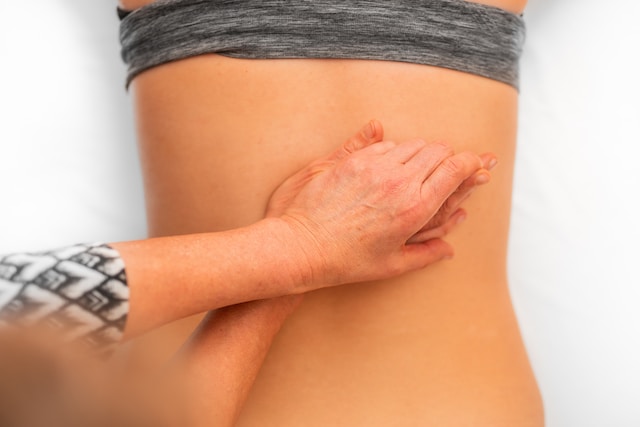There are different cases in which one may think that one is suffering from a simple contracture or muscle overload., and in reality it can be a herniated disc. For this reason, should know the Keys to identify a herniated disc. So that you can know it, it is advisable that you know some aspects básick, así as a series of tips that will help youáto be able to make a first diagnosisósad if you suffer from it, although beá You need to go to a professional to find out.én determine the problem and decide how the problem can be treated.
Index
Main causes of herniated disc
The herniated disc it is a conditionón in the spine that occurs when the gelatinous material of the intervertebral disc shifts or comes out and presses on the nerves. To identify a herniated disc you can use a series of tests.ísymptoms and complications that may lead you to think that you suffer from it, yes ok, In this type of intervention, an incision is made above the lipoma and its capsule is separated from the surrounding tissues and structures., It is essential to visit a specialist to diagnose possible problems.ños y así be able to find the best solutionón.
Among the main causes of herniated disc, we find the following:
- Degenerationón discal. As they meetños, intervertebral discs can lose resistance and elasticity, making in this way máare prone to suffering from a herniated disc.
- Muscle weakness and poor posture. Maintaining an inappropriate posture for long periods of time, especially when lifting objects or sitting in an inappropriate posture, can lead to the development of a herniated disc. Además, the weakness of the múback and abdominal muscles can increase stressés on disks.
- Gene factorséticos. Some people may have a predispositionón by gene factorsétics to develop problems in the invertebral discs, and this can lead to the risk of a herniated disc..
- Injuries and trauma. When something occursún type of trauma eventático, like when you have a houseígive it a traffic accidentáfico, así like a woundón sports, can lead to a herniated disc as a result of pressureón that is exerted on the intervertebral discs.
- Repetitive movements and overexertion. Lifting heavy objects in an inappropriate manner or performing repetitive movements that involve bendingón o torsoóexcessive n of the spine, may help increase the risk of herniated disc.
- Sedentary lifestyle. By úlast, but no less important, Sometimes a herniated disc is caused by maintaining a sedentary lifestyle.. Lack of activity fíregular physical activity and weakening of the musclesúBack pain can increase the likelihood of suffering from this spinal problem..
Secondly, It should be noted that a herniated disc can occur in any part of the spine., but it's meás comúno in the lower back, that is to say, in the regionón lumbar, and alsoénot on the neck, in the regionón cervical. The aforementioned causes can occur individually or in combination.ón of several of them.
Keys to identify a herniated disc
If you want to know the keys to identify a herniated disc, You should know that a herniated disc is a conditionón in which the núcleus pulposus of an intervertebral disc, that moves or herniates throughés of a crack or weakness in the surrounding annulus fibrosus. This can cause pressure to be exertedón on nearby spinal nerves and cause a series of síntomas.
between theísymptoms and complicationsácommon s that can lead you to identify that you suffer from a herniated disc. Although these may vary from person to person., depending on the locationón and the degree of compressionón nervous.
Some of the síSymptoms and complications that may lead you to think that you suffer from it are the following::
- Pain. He símy youtháIt is common when you suffer a herniated disc to feel pain in the affected area. The pain may be stabbing, sharp the sordo, and is usually located in the lower back, which means that you suffer a lumbar disc herniation, or on the neck, that in that case one suffers a cervical disc herniation. The pain may radiate to the lower or upper extremities, being able to continue like thisí the path of compressed nerves.
- Tingling and numbness. A herniated disc can cause abnormal sensations, like numbness, tingling or weakness in the áAreas of the body affected by compressed nerves. A herniated disc in the lower area, may cause numbness in the legs or feet, while a herniated disc in the regionón cervical podríto have similar effects on hands or arms.
- Muscular weakness. I understood herón of the nerves can affect the functionón of the múscles in the áareas in which it affects, causing muscle weakness in the affected extremities. Muscle weakness can cause difficulties when lifting objects, Grab, walk or do somethingún type of hand movement.
- Balance and coordination problemsón. In the cases más severe, A herniated disc can interfere with balance and coordination.ón motora, which can lead to a person having difficulty walking, así how to have the necessary stability or make precise movements.
likewise, There are different complications that can occur in severe herniated discs, which can cause major health problems. Among them we can find severe nerve compressions, that can lead to péloss of bladder or bowel control, severe or even muscle weaknessálysis; sícauda equina syndrome, which can causeísymptoms such as severe pain in the lower back, leg weakness, péloss of control in the intestines or bladder, decreaseón sensitivity in the saddle area; and complications afterúrgicas, that occur in some cases in which surgery is necessaryíto treat herniated disc.


